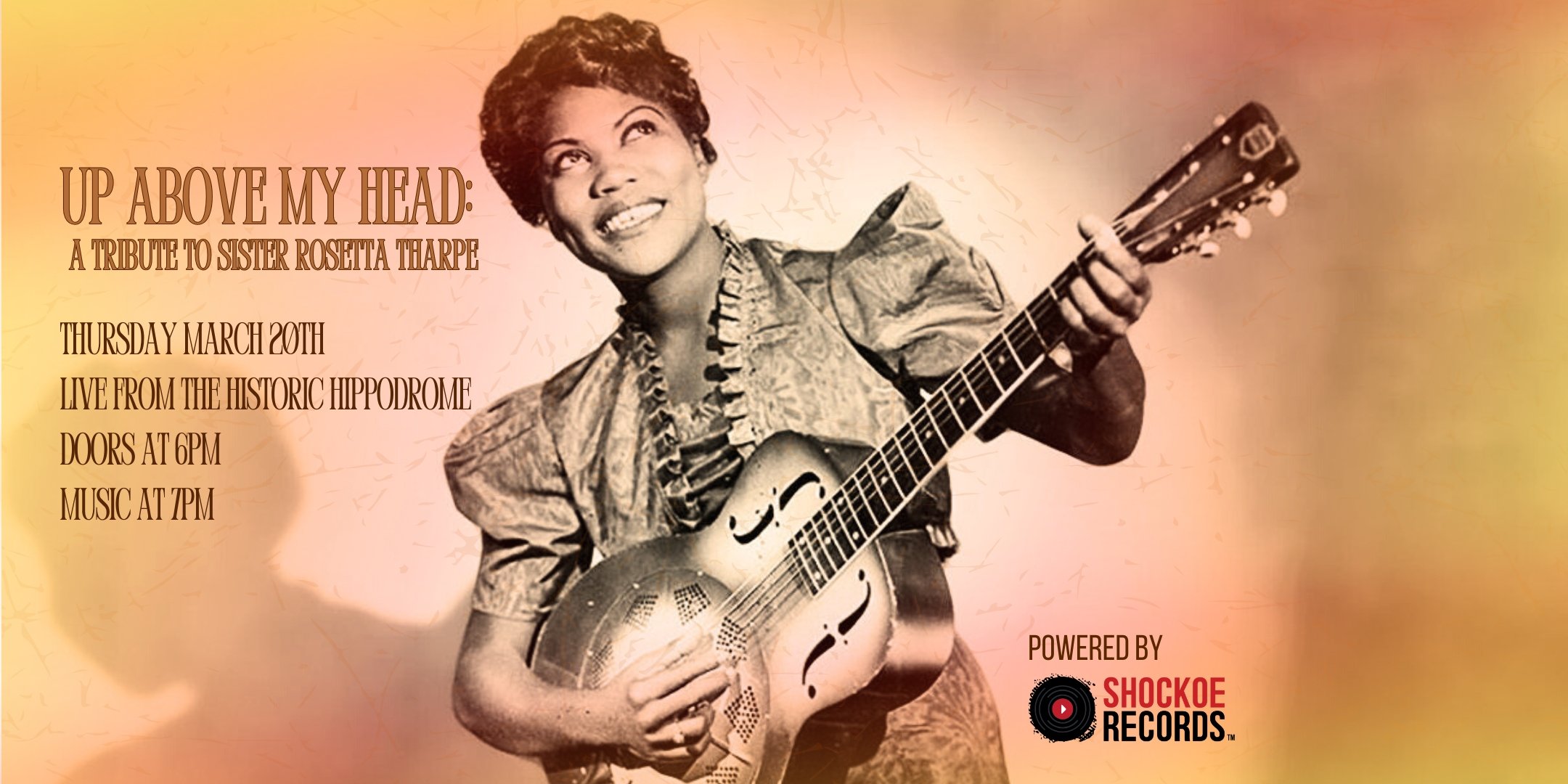
She’s the Godmother of rock & roll. Everyone from Chuck Berry to Elvis to Jimi Hendrix copied her style. Her fame was international. Richmond, Virginia was her home.
Sister Rosetta Tharpe was an icon. She lived in Richmond at the peak of her fame, and was a resident for nearly a decade. Now, we’re honoring her legacy in a new way!
Led by musicians and artists from across the Richmond area, a new celebration of Sister Rosetta Tharpe‘s history in Richmond is underway. Whether declaring a city holiday, developing historic markers, uplifting her name in road signs or scholarships, this is a movement to shine a brighter light on her legacy.
Up Above My Head: A Tribute to Sister Rosetta Tharpe will be a celebration of one of the greatest musicians to call Richmond home.
At the historic Hippodrome, a selection of Richmond‘s brightest stars will perform Sister Rosetta Tharpe’s music. Throughout the night, you’ll hear some of Tharpe’s greatest hits and learn about her life, her fame, and her impact.
The proceeds of the event will go directly to finding ways to celebrate Sister Rosetta Tharpe’s connection to Richmond, as a musical legend in the history of gospel and rock & roll.
Rosetta's History
Born in Cotton Plant, Arkansas in 1915, Sister Rosetta Tharpe was raised in the church. She was steeped in the soul-rattling tradition of gospel music, and embodied every ounce of its passion and fury.
After her mother separated from her father in 1921, Rosetta and her mother moved to Chicago. They arrived in the Windy City at a unique time in American history. Jazz, blues and gospel were colliding together in a confluence of Black migrants from the South, bringing new ideas and rhythms together.
Throughout her youth and into her teens, Rosetta became a star of the church. Her music performances, her singing, her dancing captivated congregation after congregation. She was a nationwide celebrity in the church.
After a failed marriage at 19, Tharpe moves to New York City in 1938, another hotbed of culture and music and rhythm for Rosetta to absorb. Within a year, Rosetta is signed with Decca Records, who she would stay with for the majority of her career. Now, she was off to the races.
She made secular hit after secular hit, and her church-going hometown looked on in grief. She had seemingly abandoned her roots and was singing sexual music in places like the Cotton Club. Yet, Rosetta’s mother was still by her side, and would be a continual reminder of the faith she needed to carry.
With a foot firmly planted in secular music, and mainstay gospel music as a foundation of her repertoire, Sister Rosetta Tharpe became a national celebrity.
Throughout the 40s, she enjoyed regular radio play, wildly successful tours, and hit records. In the wake of the Second World War, Sister Rosetta Tharpe moves to Richmond, Virginia.
When she comes to Richmond, she finds her musical director and assembled her backing vocalists, The Rosettes. Together, they would continue to tour America delighting audiences at every venue. A year after she moved to Richmond, in 1949, she would celebrate the anniversary of her residency with a concert at the Mosque (now Altria Theater).
Sister Rosetta Tharpe‘s third marriage was a spectacle. At Washington DC‘s Griffith Stadium, Sister Rosetta Tharpe got married to Russell Morrison in front of 25,000 paying customers. At her own wedding, she performs a concert with The Rosettes, who she met in Richmond. The wedding would be recorded as an album, and lifted record sales.
Yet, throughout the 50s, Sister Rosetta Tharpe’s popularity would wane as rock & roll, — inspired by her rhythm, playing, and performance — would be ascendant with names like Chuck Berry and Elvis Presley.
In 1957, Tharpe lost her home in Richmond and moved with her mother and Morrison to Philadelphia. Not long after the move, she’s touring again, but this time riding a wave of gospel and blues popularity in Europe.
Throughout the 60s, she enjoys a resurgence of fame. She does sold out show after sold out show, building a new fan base who haven’t had the privilege of seeing a Black gospel artist in the flesh.
In 1973, Sister Rosetta Tharpe dies. Her funeral was a small affair, but her impact on American music was enormous. Her influence in the development of rock & roll is undeniable. The fame she enjoyed at the height of her career was remarkable.
Sister Rosetta Tharpe was recognized in the Rock & Roll Hall of Fame in 2018, honored as the first guitar heroine of rock & roll.





